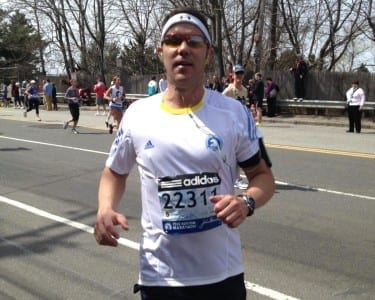Julia Moffitt, David Reinhardt, Eric Lew and Jake Summers were at different locations during the Boston Marathon on April 15, but when the first bomb exploded at approximately 2:50 p.m., they had the same thought: Something bad had happened.
“The sound was so out of place at that type of event,” says Julia Moffitt, Ph.D., associate professor of physiology and pharmacology. She had crossed the finish line and was in the runners’ changing tent when the explosion occurred. “We all wondered, ‘Was that a cannon?’ Then I had this ‘God, I hope that isn’t what I think it is’ feeling.”

David Reinhardt, D.O.’93, a partner with Pennsylvania Orthopedic Associates in Huntington Valley, PA, crossed the finish line 28 minutes before the blast, running his best Boston time in four years. “I was going to stop running – this was to be my last,” he says.
Meanwhile, Eric Lew, D.P.M.’11, and Jake Summers, D.P.M.’12, volunteers in two of the marathon’s medical tents, were alerted their teams would soon begin receiving casualties. The bomb blasts injured more than 170 people and took the lives of three spectators.
“The med tent instantly transformed into a triage area,” says Lew, a resident at the Cleveland Clinic in Ohio. “Some of the victims brought through the tent were severely injured and in obvious critical condition. They were put straight on to the ambulances waiting at the back of the tent. The remaining injured were placed into the tent.
“Just about every patient we saw was covered in blood, debris, with shrapnel in their wounds and smelled of explosive material,” he continues. “Taking the lead from an ER volunteer physician, I helped with performing physical exams, checking vitals, applying pressure to actively bleeding wounds, bandaging, etc.”
Summers and his fellow volunteers suddenly switched from treating dehydration, hyponatremia and cramps to traumatic lacerations and worse. “One of the more challenging things was that we were not set up to treat those kinds of wounds. We had very little dressing supplies,” he says. “I never thought I would be in a situation where, as I cut off people’s bloody clothes, I would have to consider things like saving their belt to use as a tourniquet.”
Amid that unexpected, tragic situation, Summers, a resident at Mount Auburn Hospital in Cambridge, MA, and Lew agree DMU’s College of Podiatric Medicine and Surgery and subsequent residency training prepared them to provide high-quality care working alongside other medical professionals.
“I treated very few feet that day but felt as comfortable and confident treating people with the severe wounds and trauma of that day,” Summers says.
After agonizing uncertainty, Moffitt and Lew, whose mother, Susanna Lew, had run her sixth Boston Marathon, were relieved to learn their loved ones were uninjured. Still, Moffitt is sobered by the fact she “ran by every single one of those victims.”
“The energy at the Boston Marathon is constant. You wonder how can some of these people scream for four hours,” she says. “That’s why we runners are so incensed – all those innocent people. There is no happier place on the planet than the finish line of the Boston Marathon, and they picked that place to bomb.”
Suspected bombers Tamerlan Tsarnaev, who was killed in a gunfight with police, and brother Dzhokar Tsarnaev won’t quash the spirit of the event, Moffitt says. “Marathon people are pretty resilient,” she notes. “People are so committed to not let those guys take away one of America’s greatest things.”
The tragedy made Reinhardt decide he’ll run in the Boston Marathon again next year. “I will dedicate and raise money for those people who lost their lives and limbs,” he says.
That determination characterizes Boston, too, Summers adds: “They picked on the wrong city.
All these people are planning to run and volunteer next year. I’ve already told my wife I’m going to be a volunteer.”

